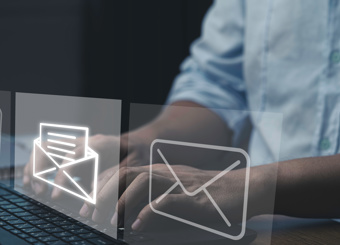What is the French e-invoicing mandate?
As a CFO or finance professional, you know the importance of keeping up with changes in regulations related to financial transactions. You’ve likely heard of the recent French mandate for e-invoicing to digitize invoicing processes, increase efficiency and modernize its invoicing system. If your business is in France or you do business with companies in France, it’s essential to understand what this mandate entails.
In this blog post, we'll share the key aspects of the French e-invoicing mandate and how to prepare for the upcoming changes.
- What is the French e-Invoicing mandate?
- Who is affected by the mandate?
- What are the requirements and obligations?
- What are the deadlines and timelines for the French e-Invoicing mandate?
- What are the benefits of e-invoicing?
- How can Medius AP automation software help?
What is the French e-Invoicing mandate?
The French e-invoicing mandate was the result of Art. 153 of France’s Finance Law 2020 which was passed by the French government on December 28, 2019. This article is part of the effort to increase digitization and increase business efficiencies in France and makes e-invoicing mandatory for all business-to-business transactions. The mandate was initially slated to take effect in July 2024, but has been postponed to allow the French economy more time to adapt to the upcoming changes.
The French e-Invoicing mandate requires businesses to send and receive electronic invoices in a specified format that conforms to France's legal and fiscal requirements–all with ambitions to:
- Boost competitiveness
- Combat VAT fraud
- Increase business efficiency
- Simplify VAT returns
The mandate was introduced to assist businesses in complying with VAT regulations, ensuring the timely processing of invoices sent or received to reduce the risk of penalties. But, e-invoice automation and standardization have many other benefits – like facilitating faster payment cycles, improving accuracy and enhancing transparency in business transactions.
Who is affected by the French e-Invoice mandate?
If your business operates within France or supplies goods or services to French enterprises or public entities, you must comply with the e-invoicing mandate. The regulation includes B2B and B2G invoice transactions and third-party service providers utilizing accounting software to send or receive invoices.
What are the requirements and obligations?
As a business, complying with the French e-invoicing mandate is crucial. But what exactly does that entail? Simply put, you must follow established technical specifications, including using structured data formats such as XML or UBL and compliance with e-invoicing syntax stipulated by French tax authorities.
Obligations for businesses:
- E-invoice issuance: Generate and transmit e-invoices to your customers in the prescribed format. Ensure the e-invoice includes specific mandatory fields, such as supplier and customer identification, invoice date, tax details and invoice amounts.
- Archiving: Store invoices electronically and ensure they're available for inspection by tax authorities upon request. Remember to maintain archived invoices' integrity, authenticity and readability throughout their retention period.
- E-invoice receipt: Be prepared to receive e-invoices from your suppliers and integrate them into your internal accounting systems.
Some points to keep in mind:
Invoice Lifecycle Management: You'll need to transmit regular invoice status updates via the government PPF platform or an accredited service provider. Companies will no longer send invoices directly to customers – they will use the PPF or the 3rd party PDP.
Receiving E-Invoices: From July 1, 2024, companies subject to VAT in France need to be able to receive e-invoices in the approved formats UBL 2.1, UN/CEFACT CII, and Factur-X. So, make sure your AP solution can handle these formats.
E-Reporting Requirements: While e-invoicing won't be mandatory for B2C and cross-border invoices, companies must send e-reporting files for these transactions with similar data points in specific formats to the government platform. The deadlines for submitting these reports depend on the reporting scheme you fall under.
Invoice Formats: Only certain e-invoice formats will be accepted after specific deadlines. By late 2026, paper and simple PDF invoices will no longer be valid for domestic B2B e-Invoicing in France. If you issue invoices electronically, they must also be archived electronically, so you'll need to have a solution for electronic invoice archiving.
What are the deadlines and timelines for the French e-Invoicing mandate?
The electronic invoicing mandate initially planned to commence in July 2024 has recently been deferred.
The project, which has been a large topic of discussion between stakeholders since 2021, is postponed to give the French economy more time to adapt to the upcoming changes.
The postponement date will be announced as part of the French 2024 finance law.
What are the benefits of e-Invoicing?
E-invoicing has many advantages, including:
- Cost savings: E-invoicing eliminates paper, postage and manual processing, delivering big savings.
- Increased efficiency: Automation throughout invoice generation and transmission diminishes human error and allows for superior operational efficiency.
- Faster payment cycles & optimized cash flow: If waiting for payments is a pain point, e-invoicing covers you. Faster invoice delivery and processing lead to quicker payment collection.
- Data accuracy and visibility: E-invoices are structured, resulting in fewer errors and discrepancies, prompting more accurate financial transaction recording and reporting.
- Improved sustainability: Shifting from paper-based to electronic invoices contributes to environmental sustainability by reducing paper consumption and waste.
- Increased productivity and employee morale: Automation and streamlined processes allow employees to focus on more strategic, essential tasks, reducing frustrating, time-consuming tasks – increasing employee morale.
The French e-invoicing mandate represents a significant step towards modernizing invoicing processes in France. By embracing e-invoicing, you can streamline operations, reduce costs, improve efficiency, and much more. You can prepare for the upcoming mandate by understanding the technical requirements, ensuring compliance, and leveraging the benefits of e-invoicing to stay ahead in the evolving business landscape.
How Medius AP automation software can help:
Medius' AP Automation solution supports all your invoicing needs and types, including e-Invoices. Collaborating with Pagero and other service providers globally, our cloud-based accounts payable automation solution centralizes incoming invoices under one roof.
Medius Capture, our patent-pending solution, captures invoice data intelligently, bringing consistency to electronic formats, including PDF, XML and many others. The highly user-friendly Medius Supplier Portal enables suppliers to flip and upload invoices from purchase orders.
With Medius, you can manage your accounts payable with ease and peace of mind – and comply with the latest e-invoice regulations. Our team is here to support these types of business changes you so that you can focus on your business. Contact us today to learn more.






